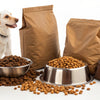Why Won't My Dog Eat Kibble But Eats Everything Else? Understanding Your Pup's Eating Habits
- Houndsy
Table of Contents
- Introduction
- Understanding Canine Eating Behaviors
- Common Reasons Dogs Won't Eat Kibble
- How to Encourage Your Dog to Eat Kibble
- Conclusion
- Frequently Asked Questions (FAQs)
Introduction
Imagine this: you meticulously prepare your dog's dinner, only to watch in dismay as they turn their nose up at the kibble, but happily munch on any scraps or treats you offer. If you’ve found yourself in this frustrating situation, you’re not alone. A significant number of dog owners have to navigate the puzzling behavior of their pets refusing kibble while accepting other food options. Research indicates that nearly 15% of pet owners report similar feeding challenges, highlighting the importance of understanding our dogs’ eating habits.
In this post, we’ll explore the reasons behind the question, "why won't my dog eat kibble but eats everything else?" Our goal is to provide you with insights into the behavioral and medical factors that may influence your dog’s eating preferences. By the end, you will understand the potential causes of this behavior and learn practical strategies to encourage your dog to eat their kibble.
From common causes like boredom with regular food to more serious health issues, we’ll cover various aspects that may affect your dog’s appetite. We’ll also discuss how to create a positive feeding experience, emphasizing the importance of a balanced diet and healthy eating habits. Let’s dive into the fascinating world of canine eating behaviors and how we can ensure our furry friends enjoy their meals.
Understanding Canine Eating Behaviors
Before we delve into the specifics of why dogs might refuse kibble, it’s essential to recognize that dogs, like humans, can be quite picky eaters. Their preferences can be influenced by multiple factors, including their environment, routine, and health status. Understanding these behaviors is the first step in addressing the issue.
1. The Role of Instinct and Sensory Perception
Dogs are instinctive creatures driven by their senses. Their sense of smell is significantly stronger than ours, which means that the aroma of food plays a crucial role in their eating habits. If your dog's kibble lacks an enticing smell, they may choose to ignore it in favor of more aromatic options like treats or leftovers.
2. Boredom with Regular Food
Just as we sometimes tire of eating the same meal, dogs can also become bored with their kibble. If your pup has been eating the same brand or flavor for an extended period, it's not surprising they might show disinterest. This boredom can lead to selective eating habits, where they only want to consume more exciting or varied food options.
3. Psychological Factors: Stress and Anxiety
Stress and anxiety can significantly impact a dog’s appetite. Changes in their environment, such as moving to a new home, the arrival of a new family member, or even loud noises like thunderstorms, can cause them to feel uneasy. In such cases, dogs may refuse their regular food but still accept treats, which are often associated with positive experiences.
4. Dental Issues and Food Preferences
Dental health is crucial for your dog’s overall well-being. If your dog is experiencing pain from dental issues such as gingivitis or tooth decay, they may avoid kibble that requires more chewing. On the other hand, softer treats are easier to consume, leading to a preference for those over their regular meals.
5. Medical Conditions Affecting Appetite
Sometimes, a dog’s refusal to eat kibble can be linked to underlying medical conditions. Gastrointestinal issues, liver problems, or even infections can lead to a decreased appetite. If your dog is consistently refusing food and showing other signs of illness, it’s vital to consult with a veterinarian.
Common Reasons Dogs Won't Eat Kibble
Now that we’ve established some fundamental factors influencing a dog’s eating behavior, let’s explore the specific reasons why your dog may refuse kibble while eagerly accepting other foods.
1. Food Boredom
As we mentioned earlier, dogs can become bored with their regular kibble. If they’ve been eating the same flavor for too long, it’s time to introduce some variety. Consider rotating between different brands or flavors of kibble to keep mealtime exciting.
2. Overindulgence in Treats
While treats are great for training and rewards, overindulgence can lead to a spoiled appetite. If your dog fills up on treats throughout the day, they may lose interest in their main meals. We recommend limiting treats to no more than 10% of your dog's daily caloric intake to ensure they maintain a healthy appetite.
3. Changes in Routine
Dogs thrive on routine, and disruptions can lead to stress and anxiety. If you’ve recently changed your schedule or feeding routine, your dog may respond by refusing their kibble. Establishing a consistent feeding schedule can help mitigate this issue.
4. Environmental Stressors
A noisy or chaotic feeding environment can deter dogs from eating. If your dog feels distracted or anxious while eating, they may avoid their kibble altogether. Creating a quiet, separate space for mealtime can help your dog feel more at ease.
5. Preference for Freshness
Dogs have a keen sense of smell, and if their kibble has been sitting out for too long or smells stale, they may refuse to eat it. Always ensure that their food is fresh and clean, and consider storing it in an airtight container to maintain its aroma.
6. Dental Pain
If your dog has dental issues, they may find it painful to chew kibble. Regular dental check-ups and cleanings are crucial to maintaining your dog's oral health. If you suspect dental pain is a factor, consult your veterinarian for an examination.
7. Gastrointestinal Issues
Gastrointestinal problems can lead to a decreased appetite. Symptoms such as vomiting, diarrhea, or lethargy could indicate an underlying health issue. If your dog is consistently refusing kibble and showing other signs of distress, it's essential to seek veterinary advice.
8. Behavioral Factors
Sometimes, dogs develop behavioral quirks that make them more selective about their food. For example, if a dog has previously received attention or treats for refusing kibble, they may continue to exhibit that behavior in hopes of getting a similar response.
9. Age-Related Changes
Older dogs may experience changes in taste and smell, affecting their food preferences. Additionally, they might develop health issues that impact their appetite. If you have a senior dog, consider discussing their dietary needs with your veterinarian.
10. Picky Eating Habits
While some dogs are naturally more discerning about their food, it's essential to differentiate between true pickiness and potential health issues. If your dog has recently become picky, it’s worth exploring the reasons behind this change.
How to Encourage Your Dog to Eat Kibble
If your dog refuses to eat kibble, don’t worry! There are several strategies you can implement to encourage them to enjoy their meals again. Here are some effective tips:
1. Introduce Variety
Rotating between different flavors and brands of kibble can help keep your dog engaged during mealtimes. Just like us, dogs appreciate variety in their diets.
2. Make Meals More Appealing
Enhancing the smell and taste of kibble can entice your dog to eat. Consider adding a small amount of low-sodium broth or mixing in wet dog food to make the meal more enticing.
3. Limit Treats
Cutting back on treats will help ensure your dog is hungry at mealtime. Establish a rule that treats only come after they’ve eaten their kibble to reinforce the importance of their main meals.
4. Stick to a Feeding Schedule
Providing meals at the same time each day can help regulate your dog’s appetite. It also establishes a routine that they can rely on, making them more likely to eat when food is presented.
5. Create a Quiet Eating Space
Designate a calm and quiet area for mealtime. This will help your dog feel secure and focused while eating, reducing distractions that may deter them from their kibble.
6. Change the Food Bowl
Believe it or not, the type of food bowl can affect a dog’s willingness to eat. Experiment with different materials and heights to see if your dog shows a preference for one over another.
7. Consult with a Veterinarian
If your dog continues to refuse kibble after trying the above strategies, it’s essential to seek veterinary advice. A professional can help identify any underlying health issues and offer tailored solutions.
Conclusion
Understanding why our dogs refuse kibble while eagerly accepting other foods can be a complex puzzle. From boredom with their regular meals to potential health concerns, numerous factors can influence their eating habits. By being observant and proactive, we can help our furry friends develop healthier eating patterns and enjoy their kibble once again.
As we explore solutions to this common issue, it’s vital to remember that a balanced diet is crucial for our dogs' overall health. At Houndsy, we’re committed to enhancing the dog-feeding experience with innovative solutions like our Houndsy Kibble Dispenser. With its stylish design and ergonomic convenience, mealtime becomes a delightful ritual for both you and your pup.
Take a moment to reflect on your dog's feeding habits. Are they showing signs of boredom? Are you inadvertently overindulging them with treats? By addressing these issues, you can cultivate a healthier and more enjoyable feeding routine. If you're ready to elevate your dog's dining experience, consider exploring our Houndsy Kibble Dispenser today!
Frequently Asked Questions (FAQs)
Q: What should I do if my dog won't eat kibble for more than 24 hours?
A: If your dog refuses to eat kibble for more than 24 hours, it’s essential to consult with a veterinarian. This could indicate underlying health issues that need to be addressed.
Q: Can stress really affect my dog’s appetite?
A: Yes, stress and anxiety can significantly impact a dog’s willingness to eat. Changes in their environment, routine, or the presence of unfamiliar people can all contribute to their stress levels.
Q: How can I make kibble more appealing to my dog?
A: To enhance the appeal of kibble, consider adding low-sodium broth, mixing in wet food, or warming the kibble slightly to release its aroma.
Q: Should I be worried if my dog eats treats but not kibble?
A: While it’s common for dogs to prefer treats occasionally, consistently refusing kibble could be a sign of boredom, dental issues, or even health concerns. It’s best to monitor their behavior and consult a vet if problems persist.
Q: How often should I change my dog's food?
A: To keep your dog interested in their meals, consider rotating between different brands or flavors every few months. This helps prevent boredom and ensures a balanced diet.












